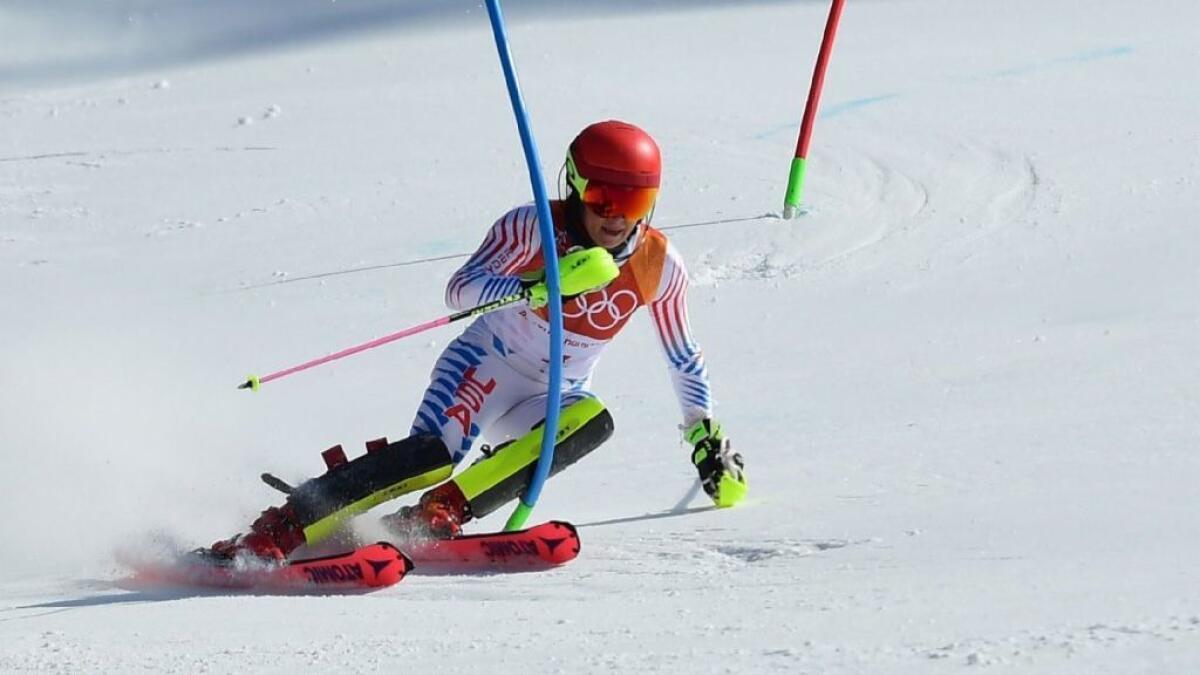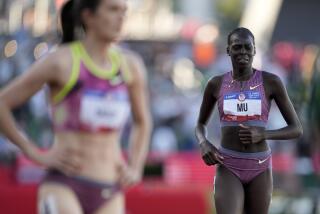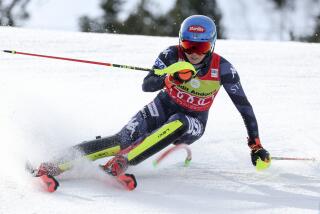Mikaela Shiffrin suffers stomach problems and then fails to medal in slalom

- Share via
The brown smudge in the snow lay amid a tangle of orange safety netting at the top of the Yongpyong Alpine Center’s slalom course.
Minutes before Mikaela Shiffrin’s first run Friday in her best event, one where a gold medal seemed to be a foregone conclusion, the U.S. Alpine skiing sensation vomited.
The pre-race upset stomach would be the first of many things that didn’t go as planned for Shiffrin, a day after her long-awaited debut at the Pyeongchang Olympics ended with a gold medal in the giant slalom.
Instead of moving closer to becoming the first U.S. Alpine skier to win three medals in one Olympics, Shiffrin failed to even medal in the slalom and finished fourth.
“It’s hard to put the blame on any one thing,” she said. “There are a lot of things that come together to make it so I don’t feel really good or feel the way I did today. It’s just one of those things. It’s life. You live and you learn.”
The shock of the result is compounded by the 22-year-old’s domination of the event in recent years. She captured the gold medal in Sochi to become the youngest Olympic slalom champion in history. On the World Cup circuit this season, she won eight of 10 slaloms and is the world’s top-ranked competitor in the event.
This is Shiffrin’s worst finish in the race since December 2014, excluding a handful of slaloms she didn’t complete.
Sweden’s Frida Hansdotter won the gold, Switzerland’s Wendy Holdener, who led after the first run, took silver and Austria’s Katharina Gallhuber captured bronze.
“It feels like a dream,” Gallhuber said. “I hope it’s real.”
Shiffrin missed the podium by eight-hundredths of a second, suddenly looking mortal.
“I didn’t really feel like myself today,” she said. “I did a lot of training runs, a lot of free skiing. I was trying to get my really good feeling back, but it just wasn’t there today to ski the aggressive way I need to to be worthy of a medal.”
After Thursday’s win in the giant slalom, Shiffrin kept a conservative schedule. A nap. Dinner. Accepting her gold medal from Liechtenstein’s Princess Nora at the Pyeongchang Medals Plaza.
Shiffrin skipped the usual commitments for U.S. gold medalists because of her ambitious program that still includes the downhill and combined.
Still, the medal ceremony kept her up until about 10 p.m. rather than going to bed at 8:30 p.m. as usual.
“It certainly was not normal preparation, but I knew going into these Olympics it’s not normal races and not normal preparation,” Shiffrin said.
She said the nausea came on suddenly before the first run. At first, she thought it felt like an illness rather than nerves. Regardless of the cause, she finished almost a half-second off the lead.
Shortly before the second run, four-time Olympic Alpine medalist Julia Mancuso posted an Instagram video of the snow where Shiffrin threw up. Mancuso, who retired in January and is working for NBC at the Games, expressed confidence in her former teammate’s ability to recover in time to claim a medal.
“She’s a magician,” Mancuso said.
But Shiffrin didn’t look like one Friday. Her second run was slower than the first, leaving her 0.40 seconds off the lead and away from the podium in front of a crowd that filled less than a third of the grandstand.
She called her conservative skiing a “huge disappointment.” Still, she remains a favorite in the combined and is within reach of becoming the first U.S. Alpine skier with three career gold medals.
Afterward, Shiffrin changed course and blamed the vomiting on nerves.
“I don’t feel sick,” she said. “It might’ve been a little bit of me trying to make an excuse.”
It was one more thing that didn’t turn out as expected.
Twitter: @nathanfenno
More to Read
Go beyond the scoreboard
Get the latest on L.A.'s teams in the daily Sports Report newsletter.
You may occasionally receive promotional content from the Los Angeles Times.











